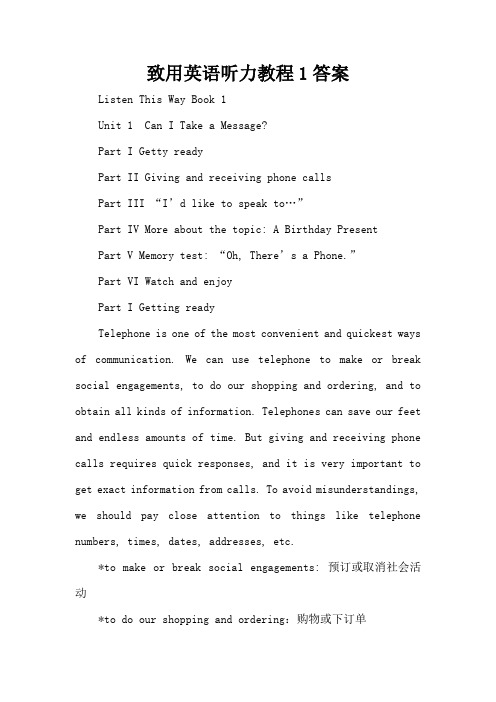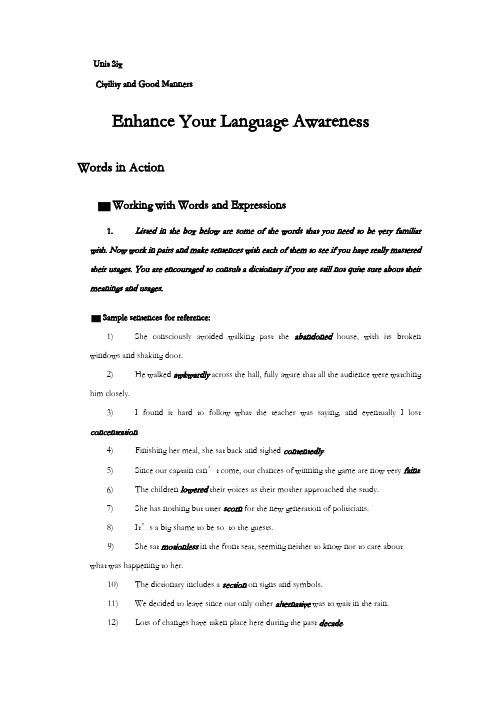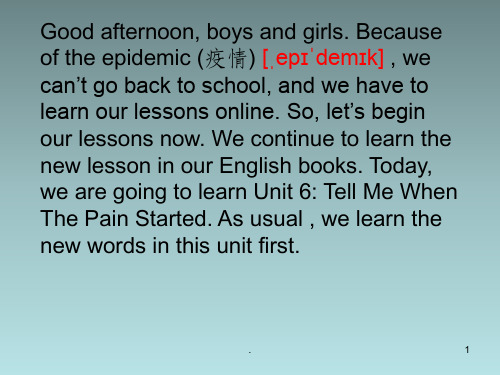完整版致用英语第二版第一册unit6
致用英语第二版第一册Unit 5

Para.2
Warm-up Reading Language in use Project Culture tips Learning to learn homework
Steven Spielberg was born on December 18, 1947 in Cincinnati, Ohio. He began to develop an interest in film as a young boy, when he would cast family members and friends in short films which he directed. At the age of 10 he produced his first movie, an 8mm western lasting three minutes. At the age of 16 with a budget of $500 he produced Firelight, a two-hour, two-minute science fiction movie. In spite of his passion for film, he was a relatively poor student in the film department of California State College.
Keys:
1.Star Wars, The Sixth Sense, and The Colour Purple. 2. Star Wars is a science fiction; The Sixth Sense is a horror movie; The Colour Purple is a drama. 3. The Colour Purple. 4. Spielberg. 5. Spielberg is a genius director. 6. In twenty minutes.
新编实用英语第二册课文译文 unit 6

Unit 6 如何在上海世博会上“幸存”一个海外参观者的亲身体验我在温哥华的姑姑最近对我说起一个中国的俏皮说法:“假如你不去参观上海世博会,你会感到遗憾。
假如你去了上海世博会,你会更加遗憾。
”我笑了起来。
这句话很真实。
花一张世博会门票的代价你就能见证到人类的伟大成就:在四平方公里的展会会场坐落着两百多个具有尖端建筑水平的国家馆。
与此同时,你还会见证和体验四五个小时令人筋疲力尽的排长队。
但是,和我姑姑的忠告相反,你还是可以去世博会并在那里度过一段美好的时光。
另外,可不要只是为了世博会而去上海。
上海是个充满活力的现代化国际城市,是一座未来之城,因此的确值得你把参观世博会的时间分一点去游览一下外滩、南京东路、超现代化的浦东,甚至临近的杭州和苏州。
相信我,第一天参观以后,世博会就会把你累垮。
如果你之前已经多次去过上海,上述景点都参观过,那么你可以把其余的时间用在上海最著名的一件事上:购物、购物、再购物。
最值得参观的展馆“哪些是该参观的最好的展馆?”这个问题提得好。
由于有两百多个场馆,而时间有那么有限,还有那长长的队伍,你不想把你在园区的那一天白白浪费掉。
事实上,对这个问题的回到在于你自己。
问问你自己:如果你去过法国,就没有必要排一个小时的队去参观微缩版的法国馆了吧(尽管这个展馆很美)。
真正的明星:中等大小的国家的展馆在热门场馆——中国馆和那些“名牌”大国展馆——前排长队很可能会让你筋疲力尽,但是你也会发现有一些场馆是真正的珍宝——那些中等国家的场馆。
中等国家展馆前排的队不长(最多10到30分钟),展品美观,内容丰富。
我喜欢的两个展馆是印尼国家馆和新西兰国家馆。
在印尼国家馆,展台排列蜿蜒曲折,排列很长,展示从珊瑚礁到文化遗址等各种各样的展品。
在新西兰国家馆,尽管里边实际的展品很少,却有一个屋顶花园,里面有很多东西,从动物模型到猕猴桃树和草药。
此外,有些国家由于太小又财力不足,无法单独建馆。
这样,它们就在一个大馆里租一块地方,按照区域或大洲分组。
全新版大学英语第二册UNIT6 Women Half the Sky

assistant principal at County High School. In her spare time she is finishing her doctoral
dissertation and the final drafts of two books, and she still has time for tennis and horse
riding with her daughters." Four words in that description undid me: in her spare time. A
friend said that if I believed everything in the report, she had a bridge in Brooklyn she'd
全新版大学英语第二册 UNIT6
UNIT 6 Women Half the Sky
2021/6/18
1
Part I Pre-Reading Task
Listen to the recording two or three times and then think over the following questions: 1. Why can't women be ignored? 2. What price have women had to pay for their wisdom? 3. What happens to them if you try to break their will? 4. Have women realized their dreams?
like to sell me.
My friend's joke hit home. What an idiot I'd been! I resolved to stop thinking about Kate's
致用英语听力教程1答案

致用英语听力教程1答案Listen This Way Book 1Unit 1 Can I Take a Message?Part I Getty readyPart II Giving and receiving phone callsPart III “I’d like to speak to…”Part IV More about the topic: A Birthday PresentPart V Memory test: “Oh, There’s a Phone.”Part VI Watch and enjoyPart I Getting readyTelephone is one of the most convenient and quickest ways of communication. We can use telephone to make or break social engagements, to do our shopping and ordering, and to obtain all kinds of information. Telephones can save our feet and endless amounts of time. But giving and receiving phone calls requires quick responses, and it is very important to get exact information from calls. To avoid misunderstandings, we should pay close attention to things like telephone numbers, times, dates, addresses, etc.*to make or break social engagements: 预订或取消社会活动*to do our shopping and ordering:购物或下订单*save our feet and endless amounts of time:省去很多脚力和时间*quick responses:快速应对A. The following words and phrases will appear in this unit. All of them are related to the telephone and some are frequently used when giving and receiving phone calls. Listen carefully and study the definitions.1.disconnected: 停机2.an unpublished number: 非公开号码3.answering machine: 电话答录机4.put through: 接通(电话)5.extension: 分机6.switchboard: 总机7.calculator: 计算器(有些计算器带储存电话号码的功能)8.telephone directory: 电话号码簿9.operator: 接线员10.hang up: 挂机rmation: 问询台12.exchange: 电话局B. Listen to part of a telephone conversation. Then choose the best response for each.1. a. Mr. Rodgers, please. b. I’ll call this afternoon. c. This is Samuel Peterson.2. a. Okay. I’ll call him right now. b. I’ll call him after lunch. c. Okay. Lunch time is fine.3.a. Yes. It’s 5345-4826 b. My name’s Craig Rice.c. My zip code is 200045.4.a. No. I'll call later. b. Yes. Go ahead. c.Yes. Please give me the message.5.a. I work for Tony. b. It’s spelled T-O-N-Y.c. That’s correct.6.a. Here’s the message. b. No. I’ll call later.c. Thank you.7.a. Okay. I’ll call her back later. b. Yes. I’ll meet her at 5:00. c. Sorry. I can’t meet her now.8.a. I’ll call him Monday morning. b. Allright. Please tell him Chris called.c. Have him call me on Monday at 9:00 a.m.9.a. Next Friday would be fine. b. Sorry. I’m busyon Wednesday at 6:00 p.m.c. Sure. No problem.10.a. Yes. I’ll call her later. b.No. Just tell herI called. C. Yes. Tomorrow is fine.C. Here are some short conversations on the phone. Please listenPay special attention to telephone numbers and addresses. Supply the missing words.1. Woman: Hello. Man: Hello. I want the County _________Woman: That’s_______. Man: Th ank you.2. Woman: Hello. Girl: ___________________, please.Woman: _________. Girl: What? Woman: I said _________. Girl: OK. Thank you.3. Woman: My husband’s broken his leg.Man: What’s your phone_________?Woman: Call just ______. The address is _____ Modern ______.Man: The _________ will be there in a few minutes.*ambulance: 救护车*in a few/five minutes: 几/五分钟之后,不是几/五分钟之内4. Woman: Hello, I’d like a______. Man: Yes? What is the _________?Woman: _____ Heath Road, Hamstit. Man: Oh, OK. The taxi will be there _________.Woman: Thank you.5.Man 1: Hello, I want a _____. Man 2: OK. What _______ is it?Man 1: _____ East ______ Street.Man 2: Ri ght*cab = taxi *avenue: 大街、大道*fire brigade:消防队6.Man: My house is on _____. Woman: Where do you _____? Man: ___ Alluson _______, Winderlon. Woman: Don’t _____. A fire ______ will be there in _____ minutes.7. Woman: Someone’s stolen my _____. Girl: Where are you calling _____?Woman: The Newton ______. Girl: The _______ will soon be there.Part II Giving and receiving phone callsMost of the time, when you dial a telephone number, your call goes through with no problem. Sometimes, however, you are not able to get through and the reason is given by a recorded message.*dial a telephone number: 拨打一个电话号码*a recorded message: 电话录音A. You are going to hear some recordings that the telephone company uses to tell you why your call did not go through. Listen carefully and write down all the telephone numbers you hear and the reasons why the calls did not go through.Sometimes even when a telephone call goes through, the caller is still unable to speak to the person being called. Instead, the call might be answered by a machine. An answering machine answers calls with a tape recording, and many answering machines also allow the caller to record a message. It’s more efficient to leave your name and telephone number than to waste your time calling again and again.*a tape recording: 主人预录在电话答录机上的话*to record a message: 客人在电话答录机上留言B. . You are going to hear several calls that are answered by machines. Listen to the recorded messages. Write down the reasons why each call is being answered by a machine instead of a person and the actions you decide to take. Write “W” for “wait on the line”, “L” for “leave a message”, and “C” for “call back later”.People usually receive telephone calls unexpectedly. Sometimes they have to make a note of the information contained in the call — particularly when the call is for someone else. Message taking is one of the most useful skills in dealing with telephone calls. A great deal of practice is needed in this respect.*message taking: 信息记录C1. You are going to hear some recorded phone calls. While listening for the first time, add more key words if you can in the left-hand column. After the second listening,complete the messages in the right-hand column with the help of the notes.。
新世纪(第二版)综合教程1unit6

Unit SixCivility and Good MannersEnhance Your Language AwarenessWords in Action▆ Working with Words and Expressions1.Listed in the box below are some of the words that you need to be very familiarwith. Now work in pairs and make sentences with each of them to see if you have really mastered their usages. You are encouraged to consult a dictionary if you are still not quite sure about their meanings and usages.▆ Sample sentences for reference:1)She consciously avoided walking past the abandoned house, with its brokenwindows and shaking door.2)He walked awkwardly across the hall, fully aware that all the audience were watchinghim closely.3)I found it hard to follow what the teacher was saying, and eventually I lostconcentration.4)Finishing her meal, she sat back and sighed contentedly.5)Since our captain can’t come, our chances of winning the game are now very faint.6)The children lowered their voices as their mother approached the study.7)She has nothing but utter scorn for the new generation of politicians.8)I t’s a big shame to be so to the guests.9)She sat motionless in the front seat, seeming neither to know nor to care aboutwhat was happening to her.10)The dictionary includes a section on signs and symbols.11)We decided to leave since our only other alternative was to wait in the rain.12)Lots of changes have taken place here during the past decade.13)The town’s population has grown by 200000—a rise of more than 20 percent.14)The rise in violence and crime is a new disturbing trend in this district.15)Basically, he’s a nice person, but he doesn’t always show it.2.In the box below are some of the words you have learned in this unit. Complete thefollowing sentences with them. Change the form where necessary.▆ Answers:1)deliberate2)deserted3)ignore4)adjusted5)neglect,6)violence7)decreased8)incident9)instincts10)swing11)inescapable12)aware3. In the box below are some of the expressions you have learned in this unit. Do you understand their meanings? Do you know how to use them in the proper context? Now check for yourself by doing the blank-filling exercise. Change the form where necessary.▆ Answers:1)i n a bad light2)f eel like3)C ooped up4)a re taking up / take up5)t ucked away6)l ose his tempe r.7)shut … up8)side by side9)10)on the rise11)put an end to ; put an end to12)for the most part▆Increasing Your Word Power1.................................................. Many words in English can be used both as nouns and as verbs. Use either the noun form or the verb form of the words given in the box below to complete all the sentences. Change the form where necessary.▆ Answers:1)scorn2)sigh3)I respect.4)neglect5)declining6)scorned7)neglect t8)decline9)swing10)has risen11) decline12)decrease13)respect14)sighing15)decrease16)swinging2.................................................. Complete the following sentences with “behavior”, “manners”, or both. Change the form where necessary.1)manners2)manners3)behavior4)manners5)manners.6)behavior7)behavior/manners8)manners9)manners10)behaviour /manners3.................................................. All the words in the following table can form acceptable collocations with the target words in italics. Cross out the word that is not similar in meaning from the rest in every group.Answers for reference:4.............................................. Did you notice the suffixes –ful, –less in words that you have come across from Units 1-6, such as harmful, dreadful, joyless, restless? Both suffixes can be added to nouns or verbs to form adjectives. When added to nouns, –ful can mean “full of”or “having the quality of”, such as careful; while –less can mean “without” or “not having the quality of”, such as careless. In this case, –ful can be understood as the opposite of –less. But when added to verbs, –ful can mean “apt to, able to; accustomed to”, such as forgetful, while –less can mean “cannot be –ed”,such as countless.Now complete the following table by adding–ful and –less to the words. Some words can be combined with only one of the prefixes. Consult a dictionary if necessary.Answers for reference:1)一个轻率的决定a thoughtless decision2)一名多产的作家a fruitful writer3)一名仁慈的老人a merciful old man4)一个壮大的国家a powerful nation5)一个和平的解决方案a peaceful solution6)一次令人愉快的聚会a delightful party7)一个健忘的人a forgetful man8)一个多事的年代an eventful age9)一个充满希望的未来a hopeful future10)一次毫无结果的调查a fruitless investigationGRAMMAR IN CONTEXTStudy the following sentences that appear in this unit and reflect on the WITH phrases. Reflect on the grammatical function of the WITH phrase serves in each sentence. Then do the following two tasks.▆Answers for reference:1) Adverbial of manner2) Adverbial of accompanying circumstances; adverbial of manner.3) Adverbial of cause4) Adverbial of accompanying circumstances5) Adverbial of mannerTask 1: Combine each pair of sentences into one containing a phrase introduced by WITH.▆ Answers for reference:1) She was holding the baby with great care.2) With (his) chin cupped in (his) hands, he looked at his mother sitting opposite him.3) A truck screamed down the pathway, with (its) headlights flashing and (its) horn blaring.4) The teacher entered the classroom, with (a/his) cup in (his) hand and (a/his) textbookunder (his) arm.5) The children stepped into the museum, with their eyes wide open out of curiosity.Task 2: Translate the following into English, using WITH phrase where possible.▆ Answers for reference:1) She likes listening to music with (her) eyes closed.2) He waved me goodbye, with eyes filled with tears.3) With the guide leading the way, the tourists walked towards the seaside.4) The first round of negotiations ended, with no agreements reached between the two sides.5) It is bad table manners to talk with (the/one’s) mouth full of food.Cloze▇Complete the following passage with words chosen from both Text A and Text B. The initial letter of each of the words to be filled in is given.▆ Answers:1)alternatives2)current3)decline4)rude5)disrespectful6)ignore7)gestures8)sheer9)courteously10)media11)spreading12)trend13)sections14)lax15) ignorantTranslation1. Translate the following sentences into English, using the words given in brackets.▆ Answers for reference:1)There’s no other alternative, all you can do is to adjust yourself to the newenvironment.2)For most people, wealth and fame does not contribute much to creating a sense ofwellbeing.3)The house has been deserted for a long time and there is a thick layer of dust on thefurniture.4)Whether it was a deliberate act or not, the school chose to ignore it and gave theboy another opportunity.5)It was that incident that made me see him in a completely different light.6)The report points out that the fire was due to his neglect of duty.7)It is rude to spit in public. I want you to put a stop to such bad behavior.8)Basically, there is nothing wrong with his learning ability. What is at the root of theproblem is his lack of interest in language learning.Theme-Related Writing▆Write an essay or a story in about 100-120 words. You can choose any ONE of the following tasks to do.(1) Discuss two behaviours in public that show disrespect to others.(2) Discuss how bad social etiquette has an impact on a child’s character development.(3) Discuss two causes of the current decline in moral values with particular referenceto respect for the elderly.▆ Sample essay for Task 1:Disrespectful BehaviourEveryone lives in a community that has a set of values it appreciates. To maintain order, harmony and peace within a community requires everyone to respect the mutually agreed set of values especially when one is in public spaces. While there are a number of behaviours that can be deemed disrespectful, two of the most significant ones are: 1) being inconsiderate; and 2) being discourteous towards others.One is being inconsiderate when one only thinks about one’s own needs, comfort and convenience. For example, we often see young passengers on a crowded bus or train who refuse to offer their seats to the elderly or pregnant women. Such youngsters are selfish and I despise them.Being discourteous, on the other hand, is showing rudeness. We were taught to say please and thank you when we were little, but today such simple words cannot be found in the vocabulary of many youngsters. A discourteous person always gives me the impression that he or she lacks strict upbringing and proper education. I tend to believe that a discourteous person can never be successful in any society. One can never be respected unless one respects others.▆ Sample essay for Task 2:He Who Keeps Company with the Wolf Will Learn to Howl Because children are young and are not exposed to many things in life, they tend to be impressionistic. They watch and take cue from adults. Therefore, if adult members of the family demonstrate bad social etiquette, their children may grow up believing that such etiquette is acceptable. This in turn may have a detrimental effect on the character development of these children. Another possible impact is that these children may not be able to differentiate between what is acceptable and what is not. It may even cause confusion when they mingle with others in public. In extreme cases, such children may be ostracized by others socially. This again does not contribute effectively to their positive character development. In short, there is a great possibility that character development of children who experience constant exposure to bad social etiquette will be negatively affected. Just as the saying goes, he who keeps company with the wolf will learn to howl.▆ Sample essay for Task 3:Respect the ElderlyIn recent decades, many of us have perceived a decline in moral values, especially in terms of respect for the elderly.There are two possible causes contributing to this decline. First, in our current society, there are an increasing number of nuclear families with only husband, wife, and children together. The phenomenon of the extended family living together is getting scarcer. Because of this, there is less opportunity for children to interact and communicate with the elderly. This may lead to intolerance towards the elderly. A second contributing factor is that today’s parents tend to spoil their children by indulging them too much. As a result, children’s undesirable behaviour cannot be corrected immediately. Children who show disrespect to the elderly may not know that they are in the wrong.Whatever the causes may be, it is crucial that children should be educated to show due respect for the elderly, for after all, every one will get old eventually.。
英语2(基础模块)(第2版)Unit 6课件精选课件

.
11
2. Listen and order.
4C
A
3B
D
The correct order: 1. __3B___ 2. __A___ 3. __D___ 4. __4C___
.
12
.
13
3. Listen and answer.
1: Who is Tom talking to? _th_e__re_c_e_p_ti_on_i_s_t _of_D_r_._S_m_i_th_’s _o_ff_ic_e_. ________________
stomachache cough
toothache headache
fever back pain
What’s the matter with him? He is coughing.
__c_o__u_g_h___
.
6
1. Look and match.
stomachache cough
toothache headache
He has back pain. .
10
• 询问某人是否不舒服时,用下列句型: • What’s the matter with him/her?或者回答 • What’s wrong with him/her?
• 回答时要注意表示病痛的词是名词还是动 词
• He/She has (a) +病痛的名词。 • He/She is 动词+ing.
fever back pain
What’s the matter with him?
He has a STOMACHACHE.
_s__to__m_a__c_h_a_c_h__e_
第一部分 必修二 Unit 6
11.pain n.痛苦;疼,痛;努力→painful adj.痛苦的,疼痛的→painfully adv.痛苦地
12.exhibition n.展览会→exhibit vt.展览,显示 13.poetry n.诗(总称)→poem n.诗→poet n.诗人 14.valuable adj.贵重的,有价值的→value n.& vt.价值;评价 15.elegantly adv.优雅地→elegant adj.优雅的;高雅的
沿着直的路直走一直到邮局。 3.My car finally came to a narrow road,some parts of which narrowed to only 5 meters in width.At the moment,another car ran in our direction.It was running so fast that it narrowly missed hitting mine.How dangerous it was!我的车最后走到了一条狭窄的道 路上,有些地方的宽度缩小到只有5米。这时,另一辆车朝我们的方向驶去。它跑得 太快了,差点撞到我的身上。这是多么危险啊!
Part 1
Part 2
3.“联系”高频名词荟萃 ①relation 关系,联系 ②touch 接触,联系 ③contact 联系,接触 ④link 联系,沟通
⑤connection 联系,联络
⑥association 联系,协会
Part 1
Part 2
4.-ship后缀名词知多少 ①relationship 关系 ②friendship 友谊 ③scholarship 奖学金 ④hardship 困境
12.in shallow waters 浅水水域
致用大学英语综合教程1 Unit 2 Family
致用大学英语
1
综合教程
目录 Unit 2 Family
01 Lead-in
03 Speaking
05 Focus on
Grammar
07 Extensive
Reading
02 Listening 04 Intensive Reading 06 Guided Writing 08 Project Work
1. A. There is no pinpoint. B. His upbringing environment.
C. His self-confidence. D. The woman’s fault.
2. A. Georgia and Sally.
B. Mike and Sally.
C. John and Sally.
D. John and Georgia.
3. A. Nancy is at office.
B. Nancy has tested positive for bird flu.
C. Nancy worried about the epidemic. D. Nancy’s father is in a nursing home.
01 Lead-in
Directions: Match the words with the picture
目录
02 Listening
Directions: Learn the language sounds, and finish the exercise.
There are two kinds of language sounds: consonants and vowels, and there are six types of consonants: stops(爆破音), fricatives(摩擦音), nasals(鼻音), affricates(破擦音), semivowels (半元音) and laterals(舌边音). Nasals and semivowels are always voiced; stops, fricatives and affricates can be voiced or unvoiced. 1. English stops include: /b/, /p/, /d/, /t/, /k/, /g/. 2. English fricatives include: /f/, /v/, /θ/, /ð/, /s/, /z/, /ʃ/, /ʒ/, /h/, /r/. 3. English nasals include: /n/, /ŋ/ and /m/. 4. English affricates include: /ʧ/, /ʤ/, /tr/, /dr/, /ts/, /dz/. 5. English semivowels include: /w/, /j/. 6. English lateral is: /l/.
希望英语(第二版)综合教程Unit_6
Why do you think you keep pets? Or why not?
What problems will you have when keeping pets?
S-Task 3
< Back Next > Home
Reading A
Task 1 Task 2 Text Task 3 Task 4 Task 5
Reading
Task 6 Task 7 Task 8 Task 9
&Task 1
Try to work out the meanings of the highlighted words with the help of other words.
puppy collar playful shaggy training
S-Task 1-1
< Back Next > Home
Speaking Task 1
Look at the pictures on Page 84 and list words or phrases about them. Then share your work with others.
A-Text-2
< Back Next > Home
Reading A Task 2 Text
Others keep pets because of a service the pet can provide. These are working animals with a specific function or role. There are countless examples of animals who serve specific functions with which we are very familiar, police dogs being one of them. Even some marine mammals, like dolphins, have long been kept by researchers to help in their work.
全新版英语(第二版)综合教程6单元expressions对.
新版英语(第二版)综合教程6单元expressions对.New Words and Expressionsalumnus (pl alumni).n. (esp. AmE) a (male) former student of a school, college or university (男)校友。
Bulletin.n. 简报,通讯;会刊;公告。
Item.n. a single piece of news; a single article or unit on a list or among a set 一则(消息);一条,一项,一件。
Doctoral.a. 博士的。
Dissertation.n. (博士)学位论文,专题论文。
Draft.n. a rough outline or version草稿。
undo (undid, undone).vt. disturb or upset greatly; untie, open 使烦恼,使不安;松开,解开。
hit/strike home.(of remarks ,etc.) have the intended effect (言语等)击中要害。
Idiot.n. (colloq) a fool.Incredible.a. that cannot be believed 难以置信的。
Skeptical.a. (in the habit of) doubting that sth. is true, right, etc. 持怀疑态度的,怀疑的。
Dieter.n. a person who eats less food or only certain kinds of food 节食者;忌食某些食物的人。
Devour.vt. eat (sth.) quickly and in large quantities 狼吞虎咽地吃。
Cookie.n. (AmE) biscuit 饼干。
- 1、下载文档前请自行甄别文档内容的完整性,平台不提供额外的编辑、内容补充、找答案等附加服务。
- 2、"仅部分预览"的文档,不可在线预览部分如存在完整性等问题,可反馈申请退款(可完整预览的文档不适用该条件!)。
- 3、如文档侵犯您的权益,请联系客服反馈,我们会尽快为您处理(人工客服工作时间:9:00-18:30)。
Reading Language in use
Project
Culture tips Learning to learn homework
1 致用英语
综合教程
Unit 6 Where is your opportunity?
Second edition
外语教学与研究出版社
Warm-up Reading Language in use Project Culture tips Learning to learn homework
Warm-up Reading e tips Learning to learn homework
Where is your opportunity?
Warm-up Reading Language in use Project Culture tips Learning to learn homework
Listen to the song “Opportunity” and discuss what does the song try to tell us?
B. Listen to the talk again and fill in the missing words.
I don't mean just (1) _________ . Don't just (2) _________ on every opportunity that comes your way. Find out what the (3) _________ , (4) _________ , and (5) _________ are before you do anything. If you are able to live with the risk, even if it (6) _________ , then it might be something that you want to do. (7) _________ you do, don't (8) _________ jump into something without knowing where or how you are going to (9) _________.
Warm-up Reading Language in use Project Culture tips Learning to learn homework
A. You are going to hear a talk about opportunity and success. Listen carefully and answer the following questions.
1. What is the title of the talk? 2. How many keys does the speaker give? What are they? 3. Why should we have some counsel? 4. Do you agree with the idea “Don't just jump on every
opportunity that comes your way”? 5. Where will the greatest opportunity most probably come
from?
Warm-up Reading Language in use Project Culture tips Learning to learn homework
And so it goes another lonely day You are saving time but you are miles away Your fly was drowning in some bitter tea For seeing lost opportunity Find your mirror go and look inside And see the talent you always hide Don't go kid yourself well not today Satisfaction's not far away Hold on now your exits here It's waiting just for you Don't pause too long It's fading now It's ending all too soon you'll see Soon you'll see Your coffee's warm but your milk is sour Life is short but your here to flower Dream yourself along another day
Never miss opportunity Don't be scared of what you cannot see Your only fear is possibility Never wonder what the hell went wrong Your second chance may never come along Hold on now your exits here It's waiting just for you Don't pause too long It's fading now It's ending all too soon you'll see Soon you'll see Hold on now your exits here It's waiting just for you Don't pause too long It's fading now It's ending all too soon you'll see Soon you'll see
